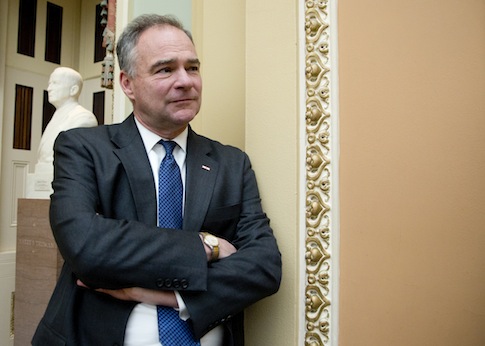Democrats who oppose the Keystone XL pipeline have thousands of dollars invested in direct competitors to the company looking to build the pipeline, public records show.
A recent environmental assessment by the State Department was seen as a step toward the pipeline’s approval, but Sen. Tim Kaine (D., Va.) remains opposed to its construction.
"In my view, there is now enough evidence to conclude that construction of this pipeline is not in America’s long-term interest," Kaine said in a statement on the review.
The freshman Democrat has between $15,000 and $50,000 invested in Kinder Morgan Energy Partners, according to his most recent financial disclosure. Kinder Morgan is looking to build a pipeline that would directly compete with Keystone.
Kinder Morgan is considering expanding its Canadian pipeline infrastructure with an expansion of the Trans Mountain Pipeline, which carries oil sands crude from Alberta to refineries and export terminals on Canada’s west coast.
The expansion would boost Trans Mountain’s capacity to 890,000 barrels per day. Keystone, a project of energy company TransCanada, is expected to carry about 830,000 barrels per day if fully constructed.
Observers have said a rejection of Keystone would be a boon for Kinder Morgan, since the Trans Mountain pipeline presents a viable alternative for exporting crude from Canadian oil sands.
Billionaire environmentalist Tom Steyer dropped his stake in Kinder Morgan last year after critics pointed out that his vehement opposition to Keystone could enrich him personally.
Kaine’s office did not respond to attempts to confirm his continued stake in the company.
The availability of alternatives to Keystone—from Kinder Morgan and Enbridge, another TransCanada competitor and Canada’s largest crude oil transporter—is integral to the State Department’s assessment that approving the pipeline will have little impact on carbon emissions, President Barack Obama’s stated standard for approval.
The State Department found that rejecting the Keystone pipeline would not stop crude from Canadian oil sands being extracted, refined, exported (whether by pipeline, rail, or tanker), and burned.
However, Kaine maintains that he is opposed to the deal because of its impact on the environment.
"Building this pipeline would dramatically ramp up capacity for tar sands oil that moves us in the opposite direction of an innovative, make-it-cleaner approach," he said in his statement.
Kaine also penned a column for the Washington Post last year opposing the project. "The real issue isn’t the pipeline," he wrote. "It’s the wisdom of using tar sands oil."
Kaine did not disclose that he had a stake in a company that would still be transporting "tar sands" oil if Keystone were to be rejected.
Another anti-Keystone Democrat, California Rep. Alan Lowenthal, has between $15,000 and $50,000 invested in Enbridge Energy Management, $1,000 to $15,000 in Kinder Morgan Energy Partners, and $15,000 to $50,000 in Kinder Morgan Management, which is a limited partner in and handles everyday management for the company’s Energy Partners subsidiary.
Lowenthal has been less outspoken then Kaine on Keystone, but he voted against legislation last year that would have approved the pipeline without sign-off from the administration, which has repeatedly put off a decision on the project.
He was also one of 22 Democrats to sign a December letter to U.S. Trade Representative Michael Froman insisting that the Keystone Pipeline would be detrimental to the environment.
Lowenthal’s office did not respond to requests to confirm his continued investments in TransCanada competitors.
Observers said his and Kaine’s investments in TransCanada competitors are troubling given their public positions on Keystone.
"This is not an ‘appearance of conflict of interest,’ it is a bald-faced conflict of interest," said Ron Arnold, executive vice president of the Center for the Defense of Free Enterprise.
Arnold, the author of Ecology Wars: Environmentalism as if People Matter, said the two legislators should "divest themselves of the tainted investments and recuse themselves from remarks and votes on the issue."
Sen. David Vitter (R., La), the ranking Republican on the Energy and Natural Resources Committee, previously criticized Steyer for maintaining a stake in Kinder Morgan while pursuing his intense anti-Keystone advocacy.
Steyer denied any financial incentive in opposing the pipeline, but opted to dump his stake, via the hedge fund he founded and led until 2012, in Kinder Morgan.
Members of Congress are not prohibited from taking positions that could benefit them financially, though legislation passed in 2012 prohibits them from trading stock based on knowledge obtained through their official duties.
